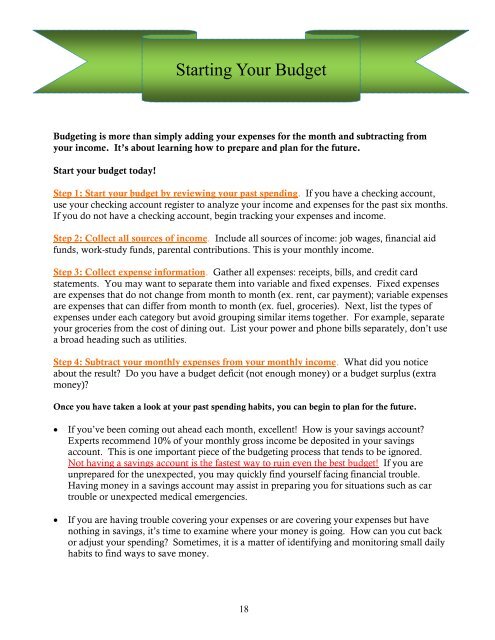Dollars and Sense
Providing you with the tools to pursue and complete college
Providing you with the tools to pursue and complete college
Create successful ePaper yourself
Turn your PDF publications into a flip-book with our unique Google optimized e-Paper software.
Starting Your Budget<br />
Budgeting is more than simply adding your expenses for the month <strong>and</strong> subtracting from<br />
your income. It’s about learning how to prepare <strong>and</strong> plan for the future.<br />
Start your budget today!<br />
Step 1: Start your budget by reviewing your past spending. If you have a checking account,<br />
use your checking account register to analyze your income <strong>and</strong> expenses for the past six months.<br />
If you do not have a checking account, begin tracking your expenses <strong>and</strong> income.<br />
Step 2: Collect all sources of income. Include all sources of income: job wages, financial aid<br />
funds, work-study funds, parental contributions. This is your monthly income.<br />
Step 3: Collect expense information. Gather all expenses: receipts, bills, <strong>and</strong> credit card<br />
statements. You may want to separate them into variable <strong>and</strong> fixed expenses. Fixed expenses<br />
are expenses that do not change from month to month (ex. rent, car payment); variable expenses<br />
are expenses that can differ from month to month (ex. fuel, groceries). Next, list the types of<br />
expenses under each category but avoid grouping similar items together. For example, separate<br />
your groceries from the cost of dining out. List your power <strong>and</strong> phone bills separately, don’t use<br />
a broad heading such as utilities.<br />
Step 4: Subtract your monthly expenses from your monthly income. What did you notice<br />
about the result? Do you have a budget deficit (not enough money) or a budget surplus (extra<br />
money)?<br />
Once you have taken a look at your past spending habits, you can begin to plan for the future.<br />
<br />
<br />
If you’ve been coming out ahead each month, excellent! How is your savings account?<br />
Experts recommend 10% of your monthly gross income be deposited in your savings<br />
account. This is one important piece of the budgeting process that tends to be ignored.<br />
Not having a savings account is the fastest way to ruin even the best budget! If you are<br />
unprepared for the unexpected, you may quickly find yourself facing financial trouble.<br />
Having money in a savings account may assist in preparing you for situations such as car<br />
trouble or unexpected medical emergencies.<br />
If you are having trouble covering your expenses or are covering your expenses but have<br />
nothing in savings, it’s time to examine where your money is going. How can you cut back<br />
or adjust your spending? Sometimes, it is a matter of identifying <strong>and</strong> monitoring small daily<br />
habits to find ways to save money.<br />
18


